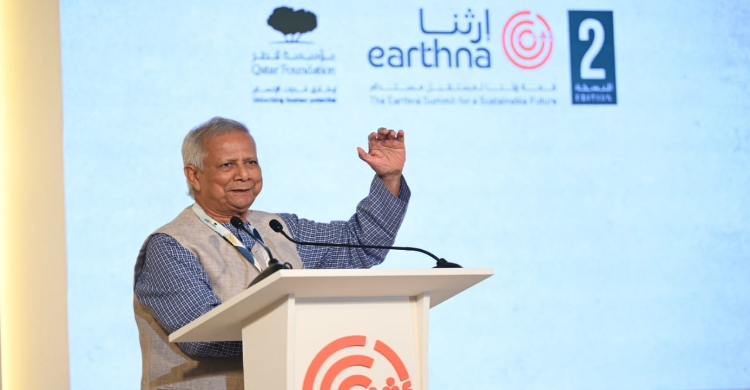CA places six proposals to build sustainable, equitable future


Chief Adviser Professor Muhammad Yunus today placed six proposals at Earthana Summit here, saying the path to a sustainable and equitable future lies in collective action.
While delivering his keynote speech at the summit, he said first, the world must expand financial inclusion to reach all marginalised communities empowering individuals with the financial tools they need to build livelihoods and participate fully in the economy.
"Second, we must champion social business as a powerful tool for addressing social and environmental challenges, fostering enterprises that prioritise purpose over profit," the chief adviser said.
Thirdly, he said the world must recognise the crucial role of youth as agents of change, creating platforms for their voices to be heard and investing in their skills and potential.
"Fourthly, we must work towards peace and justice globally, recognising that these are fundamental prerequisites for sustainable development and the well-being of all humanity," he said.
In his fifth proposal, Prof Yunus said the moral obligation of the global community should not be forgotten for providing necessary financing for undertaking the aforementioned activities.
He said developed countries must meet their ODA commitments, particularly the 0.2% GNI target for the LDCs, which remains at 0.09%.
Enhanced concessional financing, with disaster clauses, is critical for sustaining development momentum including in the graduating countries," the chief adviser said.
"Finally, we must create another culture; a counter-culture based on a different lifestyle. This lifestyle will be rooted in zero waste, zero carbon, and an economy based primarily on zero personal profit, i.e., on social business," he said.
Prof Yunus said this kind of business is a non-dividend enterprise designed specifically to solve social and environmental problems.
About the global challenges, he said: "The challenges before us are significant. But so too is our capacity for innovation, compassion, and collective action."
The chief adviser said Qatar with its initiatives like the Earthna Summit is demonstrating how a nation can harness innovation, tradition, and partnership to address the climate crisis, social inequality, and the future of work.
"My country, Bangladesh, now stands at a turning point to forge a new social contract in which the state and its people, especially its youth, co-create a future rooted in inclusion, tradition, justice, dignity, and opportunity," he said.
Prof Yunus mentioned a social contract in which financial inclusion and the empowerment of marginalised communities become integral.
Noting that Bangladesh wants to stand as a beacon of hope for the world, he invited its friends and partners to rewrite inclusive social contracts and to explore the role of social business, financial inclusion, and microfinance in fostering sustainable development and economic opportunities for the marginalised.
"Let us be bold. Let us build a world where no one is too poor to dream and no dream is too big to achieve. I leave you with this: the future is not something we inherit. It is something we create. And each one of us has a role to play," Prof Yunus concluded.
